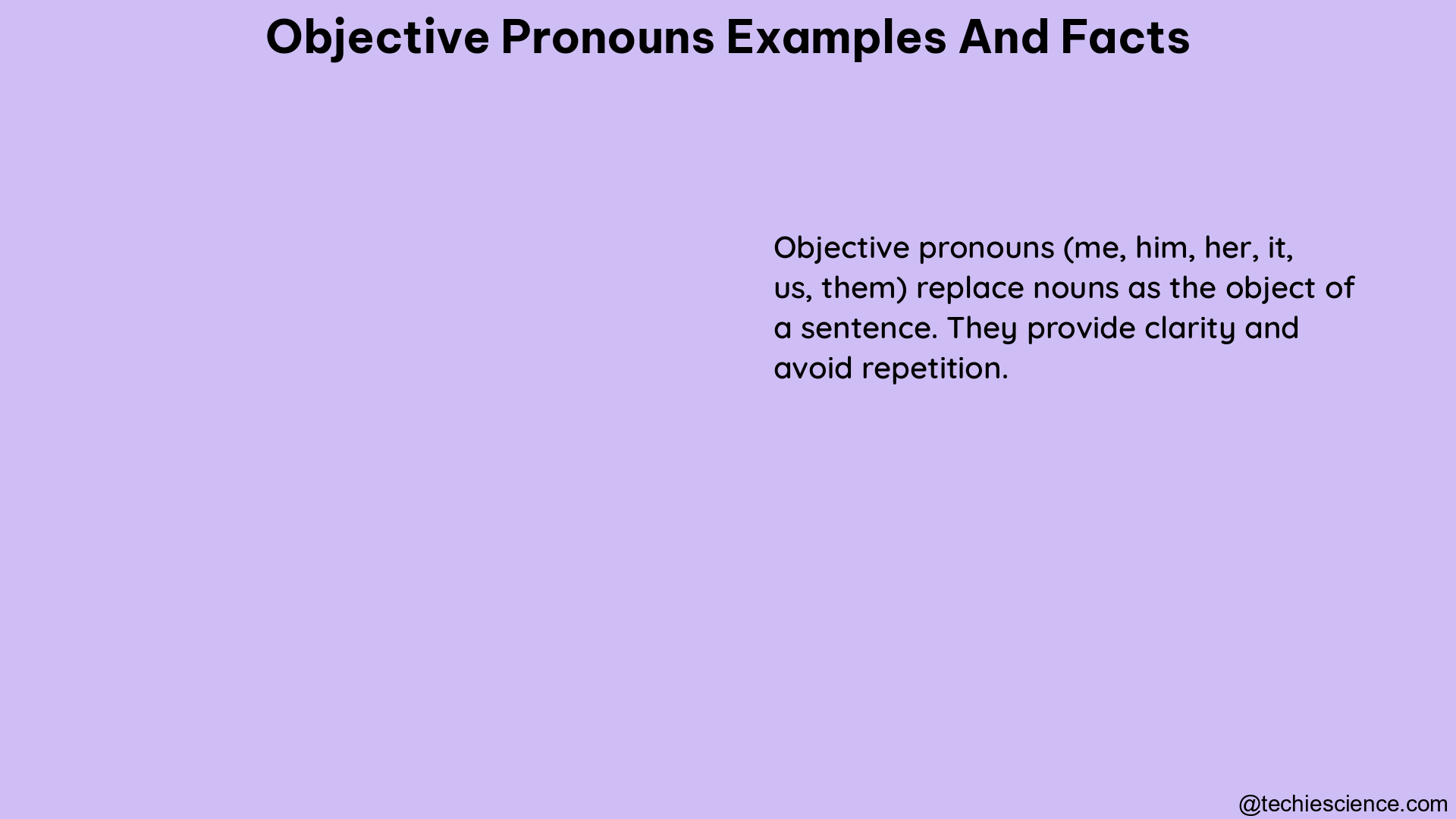Objective pronouns are a crucial aspect of English grammar, and understanding their usage and examples is essential for effective communication. This comprehensive guide will delve into the definition, function, and various examples of objective pronouns, as well as provide key facts and practice exercises to help you master this essential grammatical concept.
Definition and Function of Objective Pronouns
An objective pronoun is a type of personal pronoun that functions as the object of a verb or preposition. It represents the person or thing affected by an action and typically appears after a verb or preposition. Objective pronouns are used to replace nouns or noun phrases that serve as the object of a sentence.
Examples of Objective Pronouns

Here are the most common objective pronouns in English:
- Me: used as the object of a verb or preposition, e.g., “He told me a joke.”
- You: used as the object of a verb or preposition, e.g., “I told you a joke.”
- Him: used as the object of a verb or preposition, e.g., “Don’t tell him any jokes.”
- Her: used as the object of a verb or preposition, e.g., “Tell her jokes instead.”
- It: used as the object of a verb or preposition, e.g., “The squirrel?! No, don’t tell it any jokes, either.”
- Us: used as the object of a verb or preposition, e.g., “They finally told us their favorite joke.”
- Them: used as the object of a verb or preposition, e.g., “I tell them jokes when I am bored.”
Usage of Objective Pronouns in Sentences
Objective pronouns can be used in various ways within a sentence:
After a Verb
- “He told me a joke.”
- “I saw them at the park.”
After a Preposition
- “My dog loves going to the park with me.”
- “The book belongs to her.”
As Indirect Objects
- “She gave him a book.”
- “The teacher assigned us a project.”
As Object Complements
- “They elected me class president.”
- “The team chose her as the captain.”
Key Facts about Objective Pronouns
-
Subject vs. Object Pronouns: Subject pronouns (I, you, he, she, it, we, they) are used for the person or thing doing the action, while object pronouns (me, you, him, her, it, us, them) are used for the person or thing being acted upon.
-
Placement: Objective personal pronouns typically come after the verb or preposition in a sentence.
-
Compound Subjects or Objects: When dealing with compound subjects or objects, use the appropriate pronoun for each element. For example, “My friend and I went to the park with them and their family.”
-
Reflexive Pronouns: Reflexive pronouns (myself, yourself, himself, herself, itself, ourselves, themselves) are a type of objective pronoun that refer back to the subject of the sentence.
-
Possessive Pronouns: Possessive pronouns (mine, yours, his, hers, its, ours, theirs) are not the same as objective pronouns, as they indicate ownership or possession rather than serving as the object of a verb or preposition.
Practice Exercises
Identifying Object Pronouns
In the following sentences, identify the object pronouns:
- The teacher called on him to answer the question.
- My sister gave me a new book for my birthday.
- The team captain passed the ball to them during the game.
- The librarian helped us find the books we needed.
- The cat chased the squirrel, but it got away.
Substituting Nouns with Object Pronouns
Replace the underlined nouns with the appropriate object pronouns:
- The teacher called on the student to answer the question.
- My sister gave the book to me for my birthday.
- The team captain passed the ball to the players during the game.
- The librarian helped the students find the books they needed.
- The cat chased the squirrel, but the squirrel got away.
Tips for Mastering Objective Pronouns
- Remember the different forms of object pronouns: me, you, him, her, it, us, them.
- Practice identifying the object pronoun in a sentence: Look for the pronoun that is receiving the action of the verb or preposition.
- Use the correct pronoun for each element in compound subjects or objects: “My friend and I went to the park with them and their family.”
- Familiarize yourself with the difference between subject and object pronouns: Subject pronouns (I, you, he, she, it, we, they) are used for the person or thing doing the action, while object pronouns (me, you, him, her, it, us, them) are used for the person or thing being acted upon.
- Engage in regular practice exercises: The more you practice identifying and using objective pronouns, the more comfortable and proficient you will become.
References
- Scribbr – Subject and Object Pronouns
- Ginger Software – Object Pronouns
- Duolingo Blog – Object Pronouns in English
- Byjus – Object Pronouns
- Edulyte – Objective Personal Pronoun

The lambdageeks.com Core SME Team is a group of experienced subject matter experts from diverse scientific and technical fields including Physics, Chemistry, Technology,Electronics & Electrical Engineering, Automotive, Mechanical Engineering. Our team collaborates to create high-quality, well-researched articles on a wide range of science and technology topics for the lambdageeks.com website.
All Our Senior SME are having more than 7 Years of experience in the respective fields . They are either Working Industry Professionals or assocaited With different Universities. Refer Our Authors Page to get to know About our Core SMEs.